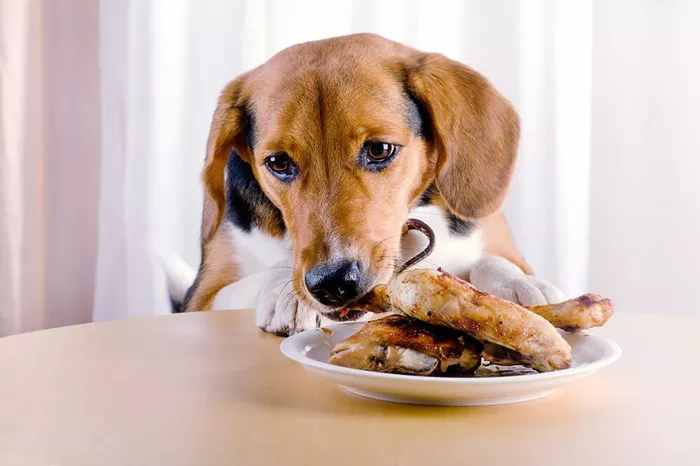Boiled chicken is a popular choice among dog owners looking for a healthy, simple food option for their pets. It is often recommended because it is lean, easy to digest, and free from harmful additives. But is it safe or advisable to feed your dog boiled chicken every day? This article explores the benefits, risks, and best practices surrounding daily boiled chicken in a dog’s diet.
The Nutritional Value of Boiled Chicken
Protein Content
Chicken is an excellent source of high-quality protein. Protein is essential for muscle development, tissue repair, and overall energy in dogs. Boiled chicken, especially the breast meat, contains lean protein with minimal fat, making it ideal for dogs needing a low-fat diet.
Vitamins and Minerals
Boiled chicken provides important nutrients such as B vitamins (B3, B6), phosphorus, and selenium. These contribute to energy metabolism, immune support, and healthy bones. However, boiled chicken lacks certain vitamins and minerals that dogs require for complete nutrition, such as calcium.
Low Fat and Calories
Because the chicken is boiled without skin or seasoning, it is low in fat and calories. This makes it useful for dogs that need to manage weight or have sensitive stomachs. Avoid frying or seasoning chicken as added fats and spices can harm dogs.
Is Boiled Chicken Safe for Dogs to Eat Every Day?
Potential Benefits
Feeding boiled chicken daily can be beneficial in some cases:
- Easy to digest and gentle on the stomach, useful for dogs with digestive issues.
- Helps in recovery from illness or surgery by providing simple, high-quality protein.
- Encourages picky eaters to consume more food due to its mild flavor.
Risks of Feeding Only Boiled Chicken Daily
Despite its benefits, there are significant risks if boiled chicken becomes the sole or primary daily diet:
Nutritional Imbalance: Boiled chicken lacks essential nutrients such as calcium, fatty acids, and fiber.
Deficiencies: Prolonged feeding can lead to deficiencies in vitamins like Vitamin D, calcium, and other minerals, causing bone issues and other health problems.
Risk of Allergies: Some dogs may develop allergies to chicken proteins if fed exclusively over time.
Monotony and Poor Diet Diversity: A diet limited to boiled chicken can reduce gut microbiome diversity and overall health.
How to Incorporate Boiled Chicken into a Balanced Dog Diet
Combine with Other Foods
Boiled chicken should be part of a balanced diet that includes:
- Quality commercial dog food or formulated homemade diets with all essential nutrients.
- Vegetables like carrots, peas, and green beans for fiber and vitamins.
- Calcium sources such as crushed eggshells or dog-safe supplements.
Portion Control and Frequency
It is safe to feed your dog boiled chicken several times a week or as a supplement to their regular food. Daily feeding is acceptable only if the overall diet is nutritionally complete.
Special Considerations for Different Dog Types
Puppies
Puppies need diets rich in calcium, fat, and vitamins to support growth. Boiled chicken alone will not meet these needs, so it should be part of a comprehensive puppy diet.
Senior Dogs
Older dogs often require diets low in fat but rich in antioxidants and joint-supporting nutrients. Boiled chicken can be beneficial but must be balanced with other supplements or foods.
Dogs with Health Issues
Dogs with digestive issues, food allergies, or obesity may benefit from boiled chicken as part of a limited ingredient diet. Veterinary guidance is important to avoid nutrient deficiencies.
Common Myths About Feeding Dogs Boiled Chicken Daily
Myth 1: Boiled Chicken Alone Is a Complete Diet
While boiled chicken provides protein, it does not supply all the essential nutrients a dog needs. A complete diet requires a balance of vitamins, minerals, fats, and carbohydrates.
Myth 2: Chicken Is Always Safe for Dogs
Although generally safe, chicken can cause allergies in some dogs. Additionally, bones or improperly cooked chicken can pose choking hazards or cause internal damage.
Preparing Boiled Chicken Safely for Your Dog
Use Plain, Skinless Chicken
Always use skinless chicken breast or thigh meat. Skin contains fat that can upset digestion or cause pancreatitis.
Boil Thoroughly
Cook chicken thoroughly until no pink remains inside to kill harmful bacteria. Avoid seasoning or adding salt, garlic, onions, or spices, which are toxic to dogs.
Remove Bones
Remove all bones carefully before serving. Cooked bones are brittle and can splinter, causing choking or internal injuries.
Portion According to Dog Size
Feed portions appropriate for your dog’s weight and activity level. Overfeeding chicken may cause an imbalance in calories and nutrients.
Signs That Your Dog May Need Dietary Adjustment
Weight Changes
Unexplained weight loss or gain can indicate nutritional imbalance or overfeeding.
Digestive Problems
Diarrhea, vomiting, or constipation may suggest intolerance or imbalance.
Coat and Skin Health
Dull coat, dry skin, or excessive shedding can indicate deficiencies in fatty acids or vitamins.
Behavioral Changes
Changes in energy, mood, or appetite can also reflect dietary issues.
Conclusion
Boiled chicken is a healthy, digestible source of lean protein suitable for many dogs. However, feeding it exclusively every day is not recommended due to the risk of nutritional deficiencies and other health problems. It is best used as part of a balanced diet, combined with other nutrient-rich foods or high-quality commercial dog food. Always consult with a veterinarian to tailor your dog’s diet to their specific needs.
Related topics:
Can I Make Dog Treats with White Flour


